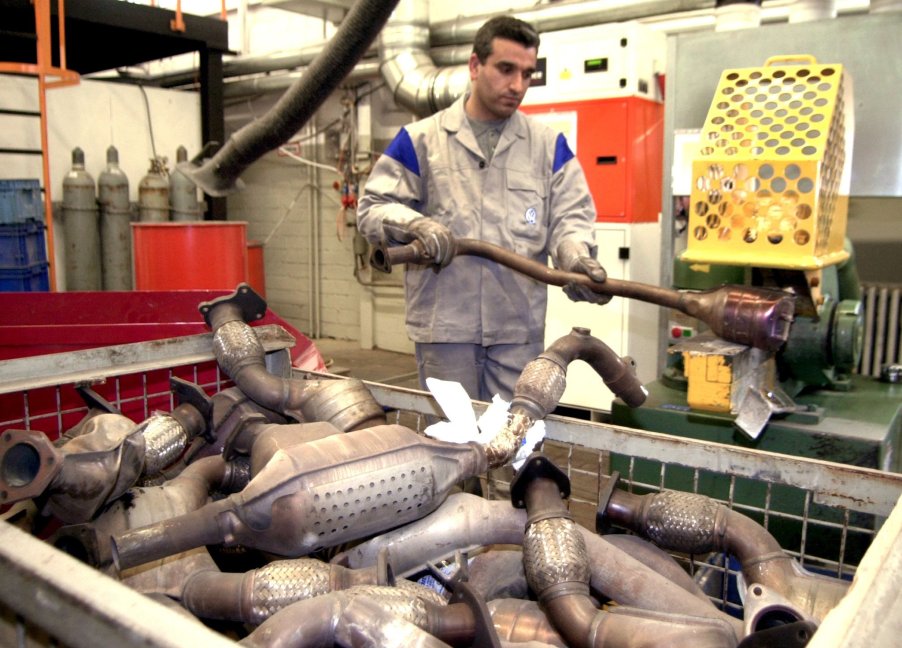
LA Has a Plan to Stop Catalytic Converter Theft: GM Says No Way
Catalytic converter thefts are way up throughout the country. And it is obvious that for car-related thefts, this is low-hanging fruit. It’s incredibly easy to cut them out of cars and especially higher-riding trucks. And thieves are hidden the whole time so it is difficult for them to be seen in the act.
Catalytic converter theft is rising across the country

LA’s District Attorney has a plan, though. George Gascón owns two hybrids and thinks about how long it will take before he’s a victim of Catalytic converter theft. With over 30,000 LA County car owners it is estimated to become victims, it could be him as much as anybody else.
Because of the rare metals inside of converters, and the pandemic fouling up supply lines, prices for old cats are up. So it goes that so are thefts. So what’s Gascón’s plan?
He’s working with carmakers to install anti-theft devices on all cats. He also wants codes stamped into converters so they can be traced when they are sold. Many manufacturers already have codes for electronic systems in vehicles already.
Coding a catalytic converter could follow the protocol used for other vehicle components

That’s why you can’t just remove your old gauges, for instance, and replace them with ones from another like vehicle. The ECU in your car communicates with every component thousands of times a minute. If it doesn’t recognize the component it is shaking hands with, the whole system shuts down.
Being able to track catalytic converters would mostly put a stop to the thefts. Metal scrappers don’t want to lose their license to be in business because they bought a ripped-off cat. Right now, there are no ways to track where the cat being sold originated from, and if it is hot.
As good an idea as this seems, wouldn’t you know that some automakers are against working with the LA prosecutor to make these thefts a thing of the past. So now he’s got a plan to force manufacturers’ hands. He already has gotten cell phone manufacturers to put safeguards in place to prevent theft. So he’s ready to go that direction if he continues to get pushback from carmakers.
“Let’s look for a solution that works”

“A cornerstone of good capitalism is to have good corporate citizens,” he told USA Today. “I’m hoping that our car manufacturers, especially the larger ones, don’t have to be dragged into this. I’m hoping that they stop for a moment and say, ‘You know, it makes sense. Let’s look for a solution that works.'”
General Motors has reasons it doesn’t want to at least explore the ideas. It told Gascón’s office that his suggestions are “neither a solution nor do they address the root cause of the problem – criminal demand.” Jason Klingensmith, assistant general counsel for GM, labeled solutions for cat thefts as “band-aids” that would only add costs to the consumer to initiate.
GM says more “stakeholders” than just GM need to be involved

“This is a complicated nationwide problem involving numerous stakeholders, including vehicle manufacturers, insurance companies, new and used car dealers, law enforcement, and scrap/recycling businesses,” Klingensmith added. This type of admission from GM that something of value to the consumer costs too much is telling. Could it be blocking other things of benefit, maybe safety-related, because of the cost?
To Klingensmith’s comments, Gascón said this indicates that “they (GM) really don’t care about the consumer and basically sends the message that we’ve made our money and this is someone else’s problem now.” GM didn’t like Gascón’s reply and added that applying these proactive suggestions “calls for multiple stakeholders to be involved in a solution and believe this does not fall solely on the automaker,” Jeannine Ginivan, a spokeswoman for GM, told USA Today.
Do you agree with GM’s assessment, or would you like to see something done?



